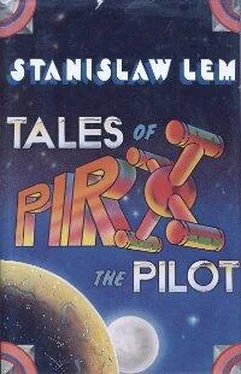This is not to say that the entire solar system was systematically probed. Compared to the vastness of space, a rocket ship is something infinitesimally small, smaller even than an atom in relation to Earth. Still, they searched high and low, anywhere the ships might have been—assuming, of course, the pilots had not simply abandoned their assigned sector. But then, what reason would they have had to leave it? They had received no radio commands or distress calls, nor were they the victims of any collision—that much, at least, had been established.
All indications were that Thomas and Wilmer had evaporated, spaceships and all, like drops of water on a blazing hot grill.
A layman endowed with some imagination, unlike his more pedestrian colleague, would have hastened to attribute the mysterious disappearances to those enigmatic creatures from other planets, creatures possessed of an awesome yet sinister intelligence who are always on the prowl in space.
But who in that advanced age of manned space exploration still believed in the existence of such creatures, not one of which had ever been encountered in the known universe? By this time the number of jokes about “creatures from outer space” far exceeded the number of cubic kilometers contained in the solar system. No one, except for the greenest recruits, whose only flight experience was in a chair suspended from the laboratory ceiling, would have bet a plugged nickel on them. If there were any inhabitants on other stars, then only on ones belonging to a distant galaxy.
Add up the handful of primitive mollusks, lichens, bacteria, infusoria—all unknown on Earth—and you have the grand total of many years’ expeditions. Even were such creatures to exist, would they really have nothing better to do than to ambush measly little patrolships in one of the most desolate, godforsaken regions of space? And how could they get within striking distance without being noticed?
The effect of such questions—and there seemed to be no end to them—was to reduce the whole hypothesis to a grand, monumental absurdity, to deprive the game of any semblance of reality. But prone as he was to the wildest fantasies during his ninth hour of flight, when faced with such ruthlessly sobering facts, even Pirx would have been strained to entertain something as preposterous as demonic beings from outer space.
From time to time, despite the zero gravity, he would tire of sitting in the same position, adjust the angle of the contour couch in which he was pinioned, and shift his gaze from left to right—without, strange as it may seem, distinguishing any of the 311 gauges, instrument lights, and pulsating dials and displays, as routinely familiar to him as the features of a face whose expression can be read without reference to any parting of the brows, arching of the lips, or pattern of wrinkles on the forehead. Just so, one glance, and dials, control lights—everything—would merge to form a single whole, a message telling him that all systems were go. Looking straight ahead, he commanded a view of both stellar screens—and between them, framed by a yellow, dome-shaped helmet partially obscuring chin and forehead, his own face.
In between the two stellar screens was a mirror, rather modest in size but mounted in such a way that a pilot could not possibly escape his own reflection. What it was actually doing there, what purpose it served, was never explained. That is to say, it was explained, but the rationale given, while ingenious, fooled hardly anyone. The mirrors were the brainchild of psychologists. Man, according to them, when subjected to long periods of unrelieved solitude, is apt to lose control over his own mind and emotions, can be lulled imperceptibly into a dreamless, wakeful sleep from which he is not always able to waken in time. Some have been known to fall victim to hallucinations of obscure origin, to fits of anxiety or severe emotional outbursts, and the ability to control one’s own physiognomy is thought to be an excellent corrective, though, to be sure, it was no fun having to stare at one’s own face for hours on end and dutifully record its every expression. And no one can appreciate this better than the pilots of patrolships. It may begin innocently enough: you make a face, you frown or grin at your own reflection, and that unleashes a torrent of grimaces, one more contorted than the next. That’s what can happen when a situation so contrary to nature goes beyond normal human endurance.
Fortunately, Pirx was not so infatuated with his own image as others were with theirs. Though difficult to verify, stories were told of those who, overcome by a debilitating boredom, were given to such embarrassing acts as spitting at their own reflection, and how, overwhelmed with shame, and in violation of all the rules, they would unfasten their straps, get up, and proceed to walk—or rather to swim—through the cabin’s zero-gravity atmosphere to the mirror, to somehow clean it before landing. There were some who stubbornly maintained that Wuertz had drilled his ship thirty-three meters into the concrete landing strip because he had put off cleaning his mirror until the moment of reentry.
Pilot Pirx had never experienced such symptoms, much less felt the temptation to spit at his own reflection—the struggle to resist often led to severe psychological damage that could have been amusing only to those who have never flown a lonely patrol. In the end, even during his worst spells, Pirx had always found something to distract him, some dependable spool around which to wind his jumbled thoughts and emotions, like a long and tangled thread.
The dial—the normal one, measuring time—showed 11:00 P.M. In thirteen minutes he would reach his orbit’s aphelion. He coughed once or twice into the microphone to test it, on a whim made the computer derive the fourth root of 8769983410567396, then showed not the slightest interest when the computer displayed the answer with the utmost speed, grinding out the digits and jiggling them nervously in its CRTs as if it were a matter of life and death; and was thinking that the first thing he’d do after landing would be to toss a glove out through the hatch door—just for kicks—light up a smoke, march down to the mess hall, order himself something hot and spicy, seasoned with paprika, and wash it down with a tall draft of beer (he was a great beer lover)—when he spotted a light.
He had been monitoring the left-front video screen, with one of those seemingly unseeing looks of his, but mentally already back in the mess hall (where he could almost smell the dark-brown camp fries, a whole batch of them, prepared especially for him), when into the center of the screen crept this luminous white dot, the sight of which stiffened his whole body with such a jolt that if not for his straps he would have slammed right into the ceiling.
The screen measured about a meter in diameter, pitch-black except for Rho Ophiuchi in the center, and the Milky Way, dissected by a yawning black void that stretched clear to the other side of the screen, which was bordered on either side by glittering Stardust. This perfect still-life spectacle was, slowly but steadily, invaded by a tiny brilliant light, which was not so tiny, however, that it couldn’t be distinguished from the stars. But then, it was not the brightness of it that had caught his attention, as much as the fact that it moved.
Luminous moving dots in space usually mean one thing: a ship’s navigation lights. As a rule, a ship’s lights are not turned on except in response to a radio call, for purposes of identification. Different ships display different kinds of lights: passenger ships are identified by one kind, freighters by another, and the same applies to high-speed ballistic rockets, patrolships, rescue ships, tankers, and so on. The lights are mounted variously, depending on the ship, and they come in every conceivable color except one—white—to make the ships distinguishable at all times from the stars. When two or more vehicles are flying in tandem, a white light on the lead ship can too easily be mistaken for a stationary light, in which case the pilot following behind runs the risk of going off course.
Читать дальше












